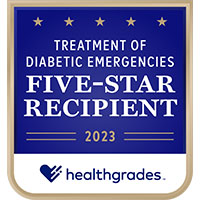All Emergency Room Services
Whether it’s a broken bone, high fever or a more severe medical emergency like a heart attack, we are ready to pro...
Find out what constitutes a medical emergency and when you should visit an emergency room or ER.
Come to our hospital knowing that we do everything possible to keep patients and staff safe.
Saint Vincent Hospital provides helpful emergency health articles and tips to keep you in the know on trending topics, c...
Celebrate Safely: 12 Fireworks Safety Tips
When you think "fireworks and the 4th of July," think fireworks safety. While fireworks are beautiful to watch, they are dangerous to play with. If not handled properly, fireworks can cause severe injuries to eyes and skin. Even sparklers and firecrackers send thousands to the emergency room each year. Here are 12 fireworks safety tips:
- Use fireworks outdoors only.
- Obey local laws. If fireworks are not legal where you live, don’t use them.
- Only adults should be allowed to light fireworks of any type. Never allow young children to play with fireworks, and supervise older children with sparklers closely. Sparklers burn at about 2,000 degrees Fahrenheit, which is hot enough to melt some metals.
- Always have water handy (a hose or bucket). Douse used fireworks with plenty of water before discarding.
- Only use fireworks as intended. Don't try to alter them or combine them.
- Never relight a "dud" firework. Wait 20 minutes and then soak it in a bucket of water.
- Use common sense. Spectators should keep a safe distance from the shooter, and the shooter should wear safety glasses. Light fireworks one at a time, and then step back.
- Don’t ever place any part of your body directly over a fireworks device.
- Don’t point or throw fireworks at another person – no horsing around.
- Alcohol and fireworks do not mix. Have a "designated shooter."
- Do not ever use homemade fireworks or illegal explosives: They can kill you! Report illegal explosives to the fire or police department in your community.
- Don’t buy fireworks packaged in brown paper because this could be a sign that the fireworks are for professional displays and could be dangerous for consumers.
Fireworks Safety Facts
The numbers tell the story when it comes to the importance of fireworks safety. According to the U.S. Consumer Product Safety Commission (CPSC):
- Approximately 7,600 of the 11,100 fireworks-related injuries in 2016 happened during the one-month period that includes the 4th of July.
- Thirty-three percent of fireworks injuries were to the hands and fingers.
- Sixty-nine percent of injuries were burns, which affect all parts of the body, except the eyes.
- Forty-seven percent of firecracker injuries were associated with small firecrackers.
- Thirty-nine percent of emergency department-treated injuries were for individuals under the age of 20.
The best way to prevent injuries from fireworks is to leave the show to the experts. Whatever you do, stay safe and have fun!

 The Emergency Room (ER) at Saint Vincent Hospital provides you with access to nationally renowned experts in emergency medicine, toxicology, cardiac problems, trauma, and more when you need them most. At the Saint Vincent Hospital Emergency Room, you’ll find:
The Emergency Room (ER) at Saint Vincent Hospital provides you with access to nationally renowned experts in emergency medicine, toxicology, cardiac problems, trauma, and more when you need them most. At the Saint Vincent Hospital Emergency Room, you’ll find: